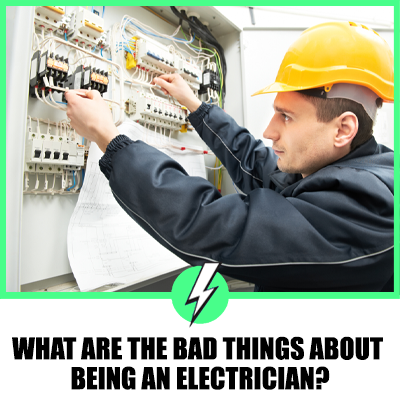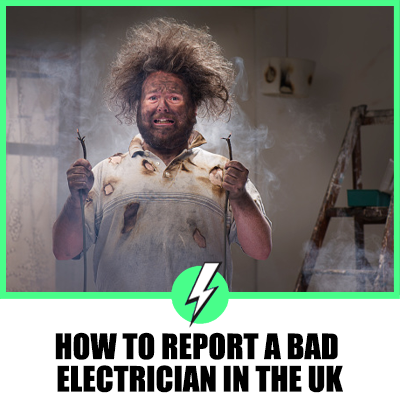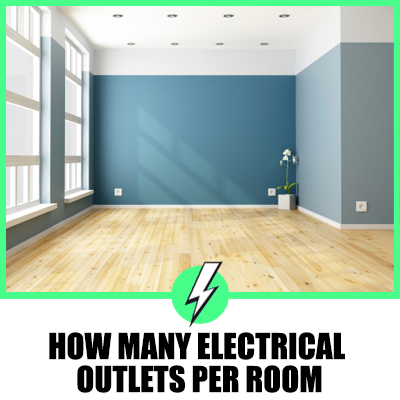What Are The Bad Things About Being An Electrician?
Is there a bad side to being a qualified electrician? Is an electrician job fulfilling and long-lasting compared to other trades?
There are negatives to being an electrician. It can take many years to become qualified and start earning decent money. You can work unsociable hours and be on call. The electrician’s job is satisfying and has longevity compared to other trades.

Contents
What are the challenges of being an electrician?
- The challenges of being an electrician can be many. You will spend four years at least training in college and onsite before you get your NVQ level 3 diploma to become accredited so you can sign off on your work. You will need to work for two or more years before applying for accreditation.
- Your job will not be 9 to 5, and you may be on-call, which screws your social life.
- The job is physically and mentally demanding, and mistakes can be costly.
- There is always a danger of electrocution and serious injuries such as burns and even death.
- Travelling time to and from the site can be long and is not paid.
These are just a few of the negative aspects of being an electrician, but there are many more.
How stressful is being an electrician?
The stresses on an electrician can be enormous, from commuting large distances to working with complex problems.
Work carried out on step ladders or traditional style ladders. While this is not a problem, imagine receiving a 240-volt shock while on a ladder!
Many injuries that electricians incur are from falls from ladders when receiving an electric shock.
The problem-solving aspect of being an electrician can be huge, given that when you arrive at a property on call, you have no idea what the problem is and what you may face if it’s not a simple RCD reset.
What are the dangers of electricity?
Everyone knows that electricity is dangerous, and the dangers are genuine for the electrician working on live electrical circuits.
There is a variety of dangers from:
- Electric shock
- Physical burns
- Neurological damage
- Seizures
- Psychological damage
- Death caused by ventricular fibrillation
Any of the above can be devastating and or life-changing, so the dangers of electricity are more than just tingling in the hands.
If the shock is not fatal but enough to burn, the burns can need skin grafts to repair the damage of the deep burn.
Is being an electrician hard on your body?
Most folks associate electricians with domestic installers, so let’s stick with that and look at what a domestic installer does daily.
If you work on a building site, you will arrive early and start running cables through the property, ready for the electricity to be connected. You will fit all of the sockets, keeping in mind there are no precut holes anywhere. It’s your responsibility to cut holes for cables in joists.
You will be up and down steps on ladders all-day, and this will be a forty-hour week. Anyone who runs cables can tell you it’s hard work.
If you work in a customer’s house, you can crawl through loft spaces with bird droppings and even rat droppings, giving rise to more dangers.
You will need to be agile when fitting cables behind cupboards.
Yes, your body can become fatigued.
5 harmful effects of electric shocks
Working with electricity is classed as hazardous, but if managed, hazards are mitigated, but six harmful side effects of electricity are all associated with shock.
Electric shock can cause:
- Muscle spasms and seizures.
- Burns to the skin and internal organs if the duration of the shock is prolonged.
- Your nervous system can be affected, causing the loss of feeling in your fingers.
- Severe electric shock can cause cardiac arrest and be fatal if not treated immediately.
- Psychological consequences such as lack of confidence to work in your chosen career with the fear of another electric shock
Electric shocks are not an occupational hazard and occur due to a lack of concentration. However, the electric shock can be catastrophic for the electrician, even if not fatal.
Do electricians work in the winter?
Of course, and for the outdoor electrician, the winter brings even more dangers to the job.
Apart from being cold and not being able to feel your fingers until you get going, the cables are harder to manipulate, and your hands become tired at the end of the day.
For linemen, the winter months are particularly hazardous and possibly busy as ice brings down power lines across frozen areas of the country.
Working under pressure
Let’s make no bones about it. As an electrician, you will be under pressure to perform and complete installations, repairs and diagnostics as speedily and safely as possible.
The old adages are right; time is money, so being delayed on a job often through no fault of your own can pile on the stress as you see your daily income shrink if you are self-employed.
An electrician under pressure is in a dangerous situation. This is when mistakes are made, and injuries can occur.
Working away from home
If you don’t live in a major city, you can find yourself travelling hours to work on a contract and staying away from home for days on end and sometimes weeks, only returning home at weekends.
It may sound like a blast for the single electrician, but working away for extended periods can add to the daily stress for electricians with family commitments.
It’s rare for a tradesman to be staying in a five-star hotel, and often the accommodation is minimal without the creature comforts of your own home.
The bad things about being an electrician are many but thankfully, the upside of being an electrician outways the bad, making being an electrician a worthwhile and rewarding trade.





